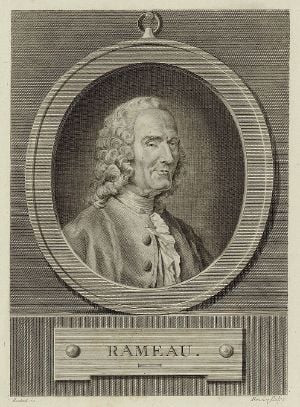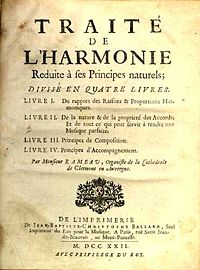Jean-Philippe Rameau
Jean-Philippe Rameau (September 25, 1683 - September 12, 1764) was one of the most important French composer and music theorist of the Baroque era. He replaced Jean-Baptiste Lully as the dominant composer of French opera, and although he was attacked by those who preferred Lully's style, he became known as a master in pre-revolutionary French opera As Rameau explained his essential musical styles in his theoretical treatises, he did so due to his concern about music theory being re-invented. Rameau stood by his philosophy that the laws of life, science and music are unchangeable universal principles just as a child's necessity for parental love is the same throughout the ages.
Life and work
Rameau's father was the organist at the cathedral of Dijon, and had his son practicing harpsichord at the earliest age possible. However, Rameau began his studies in the field of law before deciding that the study and composition of music was his true passion. He spent much of his youth in Italy and Paris, and for a time followed his father's footsteps as organist at Clermont Cathedral. Rameau was perhaps most well known for his theories regarding tonality through basses fondamentales or root notes, the idea that chords remain equivalent under inversion, described in Traité de l'harmonie (1722) and Nouveau système de musique théorique (1726). In 1722 Rameau relocated to Paris where he published many harpsichord collections as well as his Traité de l'harmonie (which was completed before his move to Paris). It wasn't until he reached his 40s that Rameau achieved prominence in the field of composition, but by the death of François Couperin in 1733 he was arguably the leading French composer of the time. From then on he devoted himself primarily to opera, starting with Hippolyte et Aricie (1733). He collaborated with Voltaire on a number of operas, in particular La Princesse de Navarre which earned him the King's title of "Compositeur de la Musique de la Chambre". At the end of his life Rameau also became a character in Denis Diderot's - then unpublished - dialogue Le neveu de Rameau (Rameau's Nephew). Even if he never composed a real symphony, he especially showed his skills in the operatic genre as an innovator of orchestral music and orchestration, influencing and anticipating the music of the Classical music era, Romantic music (Hector Berlioz), and even Stravinsky's neoclassicism in a short prelude in his last opera, Les Boréades (1763). Brahms uses the theme of one of Rameau's pieces, "The Birds", as a subject for one of his chamber works.
His music was admired by two other great French composers; Hector Berlioz, who described Rameau's art as "one of the most sublime conceptions of dramatic music". [1] The other was Claude Debussy, who was especially impressed by Rameau's opera Castor et Pollux (1737), which was revived in 1903: "Gluck's genius was deeply rooted in Rameau's works. (...) a detailed comparison allows us to affirm that Gluck could replace Rameau on the French stage only by assimilating the latter's beautiful works and making them his own." [2] Camille Saint-Saëns, Vincent d'Indy, and Paul Dukas were three other important French musicians who gave practical championship to Rameau's music in their day.
Works
Instrumental works
- Pièces de clavecin. Trois livres. "Pieces for harpsichord", 3 books, published 1706, 1724, 1728.
- Pièces de clavecin en concerts Five albums of character pieces for harpsichord and harmony. (1741)
- La Dauphine for harpsichord. (1747)
- Several orchestral dance suites extracted from his operas.
Cantatas
- Les amants trahis
- L’impatience
- Aquilon et Orithie
- Orphée
- Thétis (1727)
- Le berger fidèle (1728)
Motets
- Deus noster refugium (before 1716)
- In convertendo (c.1718)
- Quam dilecta (1720)
- Laboravi
Lyric tragedy
- Hippolyte et Aricie (1733)
- Castor et Pollux (1737)
- Dardanus (opera)|Dardanus (1739), score
- Zoroastre (1749)
- Les Boréades (1763)
Other works for the stage (operas and ballets)
- Les Indes galantes (1735-36)
- Les Fêtes d'Hébé or les Talens Lyriques (1739)
- La Princesse de Navarre (1744, text by Voltaire)
- Platée (1745), score
- Pygmalion (opera)|Pygmalion (1748)
- Naïs (1749)
- La Guirlande (1751)
- Zéphire (Les Nymphes de Diane) (1754)
- Anacréon (1757)
- Les Paladins (1760)
Writings
- Traité de l’harmonie réduite à ses principes naturels (Paris 1722)
- Démonstration du principe de l'harmonie (Paris 1750)
See also
- War of the Buffoons
External links
- (en) jp.rameau.free.fr Rameau - Le Site
- (en) amarcordes.ch Biography, works, bibliography (GroveMusic.com)
- (fr) musicologie.org Biography, List of Works, bibliography, discography, theoretical writings, in French
- (en) Jean-Philippe Rameau / Discography
- Free scores by Jean-Philippe Rameau in the Werner Icking Music Archive
- Magnatune Les Cyclopes by Rameau in on-line mp3 format (played by Trevor Pinnock)
- Free Public Domain Sheet Music by Rameau at IMSLP



